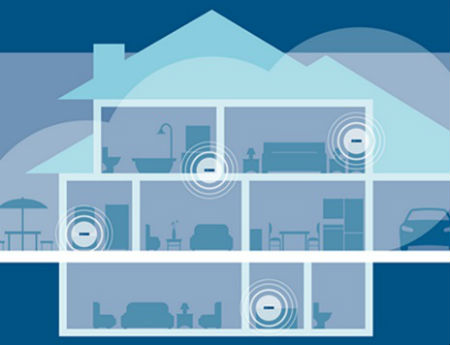Study: Home WiFi Mesh Products Work Better With a Wired Backbone
The smarter way to stay on top of the multichannel video marketplace. Sign up below.
You are now subscribed
Your newsletter sign-up was successful

Home-based WiFi mesh systems perform better when paired with a MoCA 2.0-based wired backhaul connection when compared to a set of wireless-only platforms currently available at retail, the Multimedia over Coax Alliance (MoCA) found in a field trial conducted by Dekra, in independent testing firm.
The study, commissioned by MoCA and conducted in 11 homes around the U.S., looked at performance, reliability and latency differences between Actiontec WiFi extenders with a coax-based MoCA 2.0 bonded backhaul, and three products that relied only on 802.11ac WiFi backhaul – Netgear’s Orbi, Plume and Eero.
Per the test results, Orbi achieved 300 Mbps or better in 50% of homes, while Eero and Plume had trouble reaching 200 Mbps, while the MoCA 2.0 Bonded extenders delivered 800 Mbps or better downlink WiFi performance in all homes.
Eero and Netgear have been asked for comment on the results.
Dekra, formerly AT4Wireless, performed the tests in 11 homes in Georgia, New Jersey, Virginia, Pennsylvania, Colorado and California, and nine WiFi clients were deployed for each test case. Traffic types were TCP and UDP, downlink and uplink, and traffic was sent to all clients individually in 60-second intervals in one test. In another test, traffic was sent to all nine endpoints simultaneously in an effort to emulate "real world usage.”
“These tests demonstrate that while Wi-Fi mesh may offer some improvement in whole home coverage, it is not consistent and a wire is still critical for the highest performance and lowest latency in every room,” Charles Cerino, MoCA’s president, said in a statement.
MoCA commissioned the test as ISPs start to rollout premium whole-home WiFi products and as they become increasingly popular retail options for consumers who are trying to eliminate WiFi dead zones in their homes.
The smarter way to stay on top of the multichannel video marketplace. Sign up below.
RELATED: WiFi ‘Volcanos’ No Longer Cut It
AirTies, a maker of whole-home WiFi products and monitoring systems that is gaining traction with service providers such as Midco, Frontier Communications and Sky, has been taking on a hybrid strategy that can connect through an all-wireless system or, when required due to the material composition of the home in question, tie in a MoCA or fixed-wired system.
RELATED: Midco Rolls Whole-Home WiFi Offering
Arris, meanwhile, is also taking a wired/wireless hybrid approach with a retail-focused whole-home WiFi product line launched last year that pairs WiFi with a high-speed backbone that relies on a home’s powerlines and G.hn technology. At the time, Arris said it also looked at MoCA for its new retail lineup, but found that there are more complexities around that technology with respect to in-home wiring.
RELATED: Arris Amps Up Retail Play With New Router Lineup
Google has also entered the whole-home WiFi game with a mesh product that leans on a wireless backhaul, but The Verge reports that some users are reporting issues with drops in connectivity following a recent update sent to the routers. However, Google told the pub that the issue impacted fewer than 0.01% of its devices and that the next auto-software update will fix the problem.
